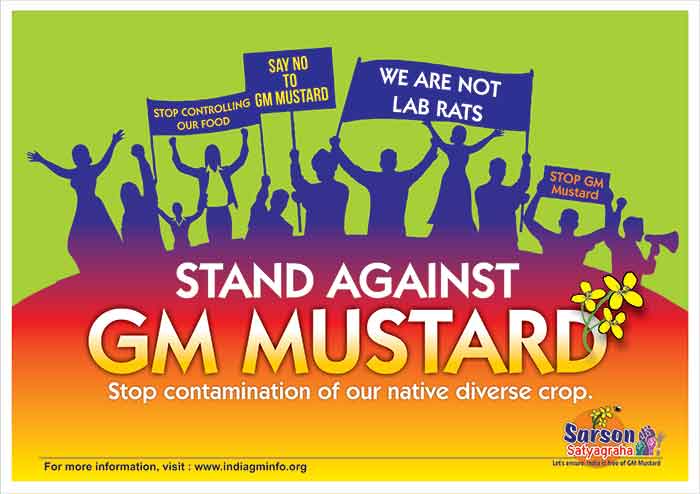
How sweeping can the reach of imperialism become, and what extreme forms can it take? Can it even take such an atrocious form as to decide what people of other countries will eat? Can it become so draconian as to insist that people have to eat food that they do not consider to be safe, or are prevented from growing and eating food they consider to be safe? These are the extremely important questions at the heart of the intense debates on GM food in Mexico today.
In a review of the existing situation titled ‘Mexico defends GM Corn restriction with Science’ the Institute for Agriculture and Trade Policy (IATP) has stated, “Since Mexico imposed its restrictions on genetically modified (GM) corn in tortillas as precautionary measures to protect public health and corn biodiversity, the United States government has repeatedly justified its challenge to the policies under the countries’ trade agreement with the claim that Mexico’s policies are not based on science. Mexico has now filed its formal response to the U.S. in the trade dispute. Published March 5, Mexico shows that it has the latest independent science firmly on its side.” (Review written by Timothy Wise, March 14 2024).
As the Mexican government notes in its 200-page response, “Far from there being a consensus on the safety of GMOs, scientific evidence points to various negative effects on health, on native corn and on the environment, derived from the cultivation and consumption of GM corn.” (119 –quotes from the document are italicized and cited here by their numbered paragraphs).
The IATP review has highlighted some of the most important quotes in the text of the Mexican government response, and some views of key academic, civil society and government leaders, who have been instrumental in the decades-long effort to stop GM corn and its companion herbicide glyphosate.
This evidence collected and presented by the Mexico government includes:
Risks from direct consumption of GM corn: 13 pages of evidence that GM corn, particularly insect-resistant Bt varieties, poses potential health risks to humans through damage to the intestinal tract and other organs. The section includes 66 academic references from peer-reviewed journals. The documented risks arise from: direct exposure through foods; epigenetic changes that can be passed to the next generation; increased antibiotic resistance; and reduced nutritional content.
“Given the fundamental importance of corn as everyday staple food in Mexico, the population in Mexico is highly exposed and vulnerable to these risks due to the amount of corn grain consumed directly on a daily basis in the form of tortilla and other foods made with nixtamalized flour and dough.” (24)
“Although the United States has attempted to trivialize and dismiss this body of scientific evidence, Mexico’s assessment indicates that the risks are real and of particular concern to human health in Mexico.” (382)
Risks from consuming glyphosate residues on GM corn: 16 pages of evidence, including 74 academic references, on the elevated risks to Mexican consumers from glyphosate residues on GM corn. Those residues have been documented to be present in Mexican tortillas already, even though it is illegal to grow GM corn in Mexico and the country produces nearly all its own white and native corn for tortillas. That evidence of traces of glyphosate, presumably from imported GM corn, is one of the main reasons for the GM corn restrictions.
Mexico’s submission cites the growing mountain of evidence that direct exposure to glyphosate causes cancer, as jury after jury has found in damage cases against Monsanto and its owner Bayer.
Multiple academic references show risks from low-level exposures from residues on consumed food. “Mexico considers that the ingestion of residual glyphosate and other contaminants present through the direct consumption of GM corn grain represents a serious food safety risk in Mexico.” (174)
Lax U.S. regulatory processes that fail to ensure safety for Mexico: Mexico questions the U.S. presentation of the science claiming safety: “The United States, far from proving that the measures identified are not based on science, presents information lacking scientific rigor, is outdated, or with conflicts of interest.” (230-235). Many of the studies cited by the U.S. show conflicts of interest, indicating funding by biotech companies or researchers associated with biotech interests. U.S. regulatory standards are weak since they do not require animal studies or other safety assessments before a new GM variety is approved. The oft-cited “4,000+ studies that show GM safety” are rife with errors. Most come from companies’ own tests when they sought approval from U.S. regulators to commercialize new GM varieties. Few are peer-reviewed. Fewer are based on long-term animal feeding trials.
Mexico highlights that the U.S. cannot produce a single academic study that shows that the long-term consumption of large quantities of minimally processed GM corn treated with glyphosate is safe to eat. That is why Mexico took the precautionary measures it did. As Mexico’s Undersecretary of Agriculture Victor Suárez told Reuters:
“To this day we have not seen any scientific studies that have been presented by the U.S. and the companies on the safety of continued consumption over years. So there is no scientific basis for the U.S. and the companies to claim that their corn is safe.”
Mexico’s careful risk assessment in accordance with USMCA guidelines: Mexico presents ample evidence that it has indeed done the risk assessment required by the trade agreement and that the agreement gives Mexico the right to determine the levels of protection it deems necessary, then interpret the available science in light of that commitment.
The absence of long-term studies with high levels of consumption forced Mexico to conduct its own risk assessment based on the available science. Mexico lists the documentation of that risk in a 31-page 2020 publication by the national science agency, which has been available for the U.S. government and the media to review. Mexico has constantly updated that evidence base in a publicly available databank that further informed its updated 2023 decree.
“The Risk Assessment evaluated the potential adverse effects on the health of Mexicans from the presence of contaminants, specifically glyphosate and GM proteins residues in foods made from GM corn commonly consumed by Mexicans.” (403)
Risks to native corn varieties from GM corn: Mexico also presents extensive evidence of the risks to native corn varieties from cross-pollination by GM corn, including a comprehensive study by NAFTA’s own environmental commission. Such contamination can undermine the genetic integrity of Mexico’s native corn varieties, which it argues is a unique and endangered natural resource valuable not just to Mexico but also to the world for future plant-breeding. Mexico cites 13 distinct national laws and international treaties that obligate it to protect native corn. That obligation includes a special exception in the current trade treaty that allows countries to take actions that guarantee cultural and Indigenous rights, of which native corn is considered an integral part.
The IATP review also quotes several experts who have praised Mexico’s response as a strong science-based justification for its policies:
“Mexico presents ample scientific evidence on the risks to human health and the environment of consuming GM corn with residues of the herbicide glyphosate. The government of Mexico has every right to determine the appropriate level of protection to protect human health,” according to Fernando Bejarano, Ph.D., Red de Acción sobre Plaguicidas y Alternativas en México (RAPAM)/Pesticide Action Network in Mexico.
“Mexicans are the largest consumers of corn, especially through tortillas. We have the right to prohibit the use of transgenic corn in the preparation of tortillas not only because of the presence of transgenic corn but also the higher concentrations of glyphosate residues. In addition, our country is the center of origin and diversity of corn, the basis of our culinary culture, which has been declared a world heritage site. We have the right to protect this food and this cultural asset,” stated Alejandro Calvillo, Poder del Consumidor.
“We welcome this vigorous defense of Mexico’s programs to transform its food system. The science they present backs up longstanding civil society campaigns for healthy foods and biodiverse agricultural systems. There’s a lot here that could contribute to more substantive debates on our food and agriculture system in the U.S., as well,” observed Karen Hansen-Kuhn, IATP’s director of trade and international strategies.
The IATP review concludes, “Ever since Mexico first announced its intentions to limit GM corn and glyphosate in its tortilla chain, the U.S. government has asserted that Mexico’s policies are not based on science. Mexico’s comprehensive response refutes that claim, presenting hundreds of academic studies that show cause for concern about human health and the threat to native corn diversity.”
Another organization Canadian Biotechnology Action Network has published a report titled ‘Mexico’s Precaution on GM Corn Safety is Justified’ (see Food Tank, report written by Lucy Sharratt).
This report says, ”The purpose of Mexico’s restrictions on GM corn is to safeguard the integrity of native corn from GM contamination and to protect human health. The purpose of the U.S. and Canadian challenge is to defend the interests of the biotechnology industry. The U.S. and Canada want to force Mexico to open its market to all genetically modified foods and seeds. Canada is supporting the U.S. challenge (as a third party in the dispute) even though Canada does not export any corn to Mexico.
“Mexico has the right to restrict the use of GM corn. The U.S. argues that Mexico’s actions are not based on scientific principles, but the government has sufficient science to justify its precautionary policies.
The Canadian Biotechnology Action Network (CBAN), is a large network of farmer and environmental groups that has been monitoring the use of genetically modified organisms (GMOs) for over 15 years, and it has extended strong support to Mexico’s restrictions.
CBAN’s analysis shows that Mexico’s ban is supported by the science. “Research continues to find indicators of potential harm to humans from eating GM insect-resistant corn. The science also continues to warn of health impacts from exposure to the herbicide glyphosate which is used in GM corn production.
“Most GM corn plants are genetically modified to kill insect pests. The GM plants express a toxin from the soil bacteria Bacillus thuringiensis (Bt) that is known to harm the guts of specific types of insects but not others. Farmers have long used Bt as a spray to kill pests but the Bt toxins in GM crops are different from this natural Bt in structure, function, and biological effects. In fact, peer-reviewed studies across the scientific literature continue to find that Bt toxins in GM plants can harm insects (spiders, wasps, ladybugs, and lacewings, for example) that are not the intended targets.
Very recently “new peer-reviewed studies further found impacts of Bt where there was assumed to be none. For example, a 2023 study conducted by a team of researchers from universities in Brazil and Colombia, funded by the Brazilian government, found Bt had many significant impacts on the health of wasps, even affecting the next generation. University researchers in China and Pakistan also found lower diversity of bacteria in the gut of wolf spiders exposed to Bt. This adds to a laboratory test published in 2023, funded by the French government, that found a particular Bt toxin disrupts normal growth and functioning of gut cells in fruit flies, raising the possibility that Bt toxins could harm the intestinal lining of animals, including humans.
“To add to these results, a number of animal feeding trials also find that Bt toxins and GM Bt crops could have toxic effects on mammals. Toxic effects and indications of toxicity have variously been observed in the blood, stomach, small intestine, liver, kidney, spleen, and pancreas, as well as immune responses, though the mechanism is not clear from these studies. Critically, animal feeding studies are not required by the U.S. or Canadian governments in order to demonstrate GM food safety. In fact, there are very few long-term and multigenerational tests on animals in the scientific literature.
“But Bt toxicity is not the only safety concern. GM corn production is also tied to the use of glyphosate and other herbicides that are linked to serious health problems including neurological diseases and some cancers. The International Agency for Cancer Research of the World Health Organization classifies glyphosate is a “probable human carcinogen” and, as successful lawsuits against Bayer/Monsanto demonstrate, there is ample evidence that direct exposure to glyphosate-based herbicides can result in non-Hodgkin’s lymphoma in particular. Critically, evidence also points to danger from exposure to residues in food which is the concern highlighted by Mexico in relation to GM corn.
“…The U.S. and Canada essentially argue that if they have decided a genetically modified food is safe, then Mexico should agree.”
Clearly in such conditions of a difficult struggle for food safety the Mexican government, farmers and activists need widespread support from all over the world.
Bharat Dogra is Honorary Convener, Campaign to Save Earth Now. His recent books include ‘India’s Quest for Sustainable Farming and Healthy Food, 14 Questions on GM Crops, A Day in 2071 and Planet in Peril.














































